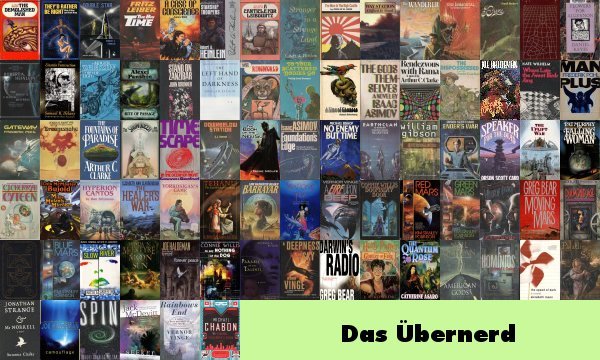 Ringworld
Ringworldby Larry Niven
1971 Hugo Winner for Best Novel
1970 Nebula Winner for Best Novel
It's hard to believe that at one time universal scale engineering wasn't a big thing in science fiction. There was an occasional planet that wasn't really a planet or a really big colony ship but changing an entire star system into one massive engineering project wasn't done. And then came Larry Niven so he's the one to blame.
Ringworld isn't really the start of the "big, dumb object" subgenre of science fiction where some mysterious and gigantic alien artifact is found and humans go to poke at it for a while. It is the book that made the idea wildly popular so we have Niven to blame for that. Niven is superb with these big ideas but very often other aspects of his works fall flat. Ringworld is one of the times when he was at the top of his form.
Somewhere in the depths of space there's a million mile wide ring around a star which thanks to some complicated engineering has a habitable surface. The result is an area that has roughly 5.655x10^14 square miles of living space. An alien from a species of cowards wants to know more about it but needs to recruit a team of people who don't curl into the fetal position when encountering something new to do it. He finds Louis Wu, a two hundred year old explorer who's undergoing a mid-life crisis; Teela Brown, a human who may have been bred for luck; and Speaker-To-Animals, one of the first diplomats from a species of conquerors. They travel to the Ringworld, are astounded by it, have some adventures, and all live happily ever after (until the unfortunate sequels).
The test of how much you would enjoy Ringworld is if the idea of building a ring around a star catches your imagination. Niven spends a lot of time justifying the engineering as best he can and it still requires a lot of hand waving and he still missed one major issue. There's long passages describing how strong the material making the floor would have to be, how they would manage the forces on the water, how to deal with impacts from objects wandering into the solar system, and other tiny technical details that will either set your mind ablaze or bore you to tears.
The Ringworld isn't the only big idea in the book. Niven pitches just about everything and the kitchen sink in there from migrating planets to the genetic manipulation of entire species to Conan the Barbarian. It doesn't all work perfectly, though. The Ringworld itself is infamously an unstable structure. Given that it's a solid ring around the star it has to be perfectly balanced and the slightest nudge even from a variation in solar wind could set up a resonance that would quickly lead to large sections of the ring intersecting the star. Also I have quite a bit of trouble accepting the complete collapse of the Ringworld civilization.
Fortunately there's more for the characters to do than just look on at the ring in amazement. While I wouldn't call them the deepest set of characters you'll find but they are not really paper cut outs either and are sufficient to hang the story on. Niven's aliens in particular have some distinct outlooks which while they may be a little too human to pass as truly alien they are sufficiently removed from normal human reactions to make them interesting. In addition the characters actually do things rather than simply react (a trap a lot of authors fall into when writing about vast alien artifacts); while their explorations are driven by a convenient plot event their interactions are not tied to simply stumbling over the next plot element, saying "Wow, would you look at that," and then going away.
On the downside of things most of the plot does go that way. Niven doesn't put all of his story telling eggs in that Ringworld basket which helps the book out considerably but the characters do spend an awful lot of time just stumbling across the next fantastic thing. They do respond well once they've encountered the next plot device, but there's a lot of sections of people just talking out how the astounding thing they've encountered works.
I don't particularly like where a lot of the super-engineering subgenre of science fiction went. A lot of authors after Niven thought it was enough to just have their giant object and a token conflict. Ringworld is quite a bit richer than those successors since the characters are interesting and active but your enjoyment is still going to depend on how much you like that idea of building a ring around a star. If you say to yourself "Cool, I wonder how that would be done," then Ringworld is something you would enjoy.
